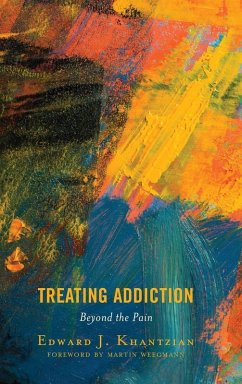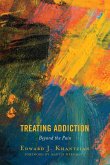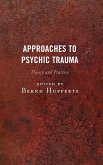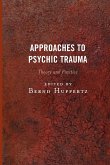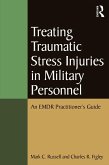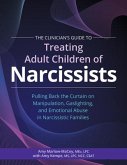- Gebundenes Buch
- Merkliste
- Auf die Merkliste
- Bewerten Bewerten
- Teilen
- Produkt teilen
- Produkterinnerung
- Produkterinnerung
Treating Addiction: Beyond the Pain emphasizes that what is needed to better treat addictive disorders is an empathic understanding of what addictively prone individuals endure that makes addiction so compelling. Khantzian uses evidence from five decades of study and treatment to show effective treatment is based on appreciation of these issues.
Andere Kunden interessierten sich auch für
![Treating Addiction Treating Addiction]() Edward J. KhantzianTreating Addiction84,99 €
Edward J. KhantzianTreating Addiction84,99 €![Approaches to Psychic Trauma Approaches to Psychic Trauma]() Approaches to Psychic Trauma183,99 €
Approaches to Psychic Trauma183,99 €![Approaches to Psychic Trauma Approaches to Psychic Trauma]() Approaches to Psychic Trauma86,99 €
Approaches to Psychic Trauma86,99 €![Counseling in a Gender-Expansive World Counseling in a Gender-Expansive World]() Douglas KnutsonCounseling in a Gender-Expansive World41,99 €
Douglas KnutsonCounseling in a Gender-Expansive World41,99 €![Counseling in a Gender-Expansive World Counseling in a Gender-Expansive World]() Douglas KnutsonCounseling in a Gender-Expansive World129,99 €
Douglas KnutsonCounseling in a Gender-Expansive World129,99 €![Treating Traumatic Stress Injuries in Military Personnel Treating Traumatic Stress Injuries in Military Personnel]() Mark C. RussellTreating Traumatic Stress Injuries in Military Personnel73,99 €
Mark C. RussellTreating Traumatic Stress Injuries in Military Personnel73,99 €![The Clinician's Guide to Treating Adult Children of Narcissists The Clinician's Guide to Treating Adult Children of Narcissists]() Amy Marlowe-MaCoyThe Clinician's Guide to Treating Adult Children of Narcissists18,99 €
Amy Marlowe-MaCoyThe Clinician's Guide to Treating Adult Children of Narcissists18,99 €-
-
-
Treating Addiction: Beyond the Pain emphasizes that what is needed to better treat addictive disorders is an empathic understanding of what addictively prone individuals endure that makes addiction so compelling. Khantzian uses evidence from five decades of study and treatment to show effective treatment is based on appreciation of these issues.
Hinweis: Dieser Artikel kann nur an eine deutsche Lieferadresse ausgeliefert werden.
Hinweis: Dieser Artikel kann nur an eine deutsche Lieferadresse ausgeliefert werden.
Produktdetails
- Produktdetails
- Verlag: Rowman & Littlefield Publishers
- Seitenzahl: 294
- Erscheinungstermin: 13. Februar 2018
- Englisch
- Abmessung: 235mm x 157mm x 22mm
- Gewicht: 631g
- ISBN-13: 9781538108574
- ISBN-10: 1538108577
- Artikelnr.: 50446002
- Herstellerkennzeichnung
- Libri GmbH
- Europaallee 1
- 36244 Bad Hersfeld
- gpsr@libri.de
- Verlag: Rowman & Littlefield Publishers
- Seitenzahl: 294
- Erscheinungstermin: 13. Februar 2018
- Englisch
- Abmessung: 235mm x 157mm x 22mm
- Gewicht: 631g
- ISBN-13: 9781538108574
- ISBN-10: 1538108577
- Artikelnr.: 50446002
- Herstellerkennzeichnung
- Libri GmbH
- Europaallee 1
- 36244 Bad Hersfeld
- gpsr@libri.de
EDWARD J. KHANTZIAN, MD, is professor of psychiatry at Harvard Medical School and past president of the American Academy of Addiction Psychiatry. Dr. Khantzian is a distinguished scholar, psychiatrist, and psychoanalyst, specializing in addictions for more than forty years. His other work includes Treating Addiction as a Human Process and (with Mark J. Albanese) Understanding Addiction as Self Medication: Finding Hope Behind the Pain.
Foreword by Martin Weegmann Introduction Part I. The Internal Terrain of
Addiction Psychodynamics 1. Understanding Addictive Vulnerability: An
Evolving Psychodynamic Perspective 2. Questions of Substance: Psychodynamic
Reflections On Addictive Vulnerability and Treatment 3. Addiction: Why Are
Some of Us More Vulnerable Than Others 4. The Capacity for Self-Care and
Addiction 5. The Self-Medication Hypothesis and Attachment Theory: Pathways
for Understanding and Ameliorating Addictive Suffering Part II. The
Self-Medication Hypothesis Revisited 6. The SMH and Addiction as a Problem
in Self-Regulation 7. The Self-Medication Hypothesis Revisited: The Dually
Diagnosed Patient 8. Self-Medication Hypothesis: Connecting Affective
Experience and Drug Choice 9. The Self¿Medication Hypothesis and
Psychostimulant Treatment of Cocaine Dependence: An Update 10. The
Psychodynamics of Addiction and Its Treatment: An Interview with New
Therapist Magazine Part III. Treatment of Addictive Disorders 11.
Reflections on Group Treatments as a Corrective for Addictive Vulnerability
12. More Reflections on Group Therapy (Interview by Martin Weegmann) 13.
'Dangerous Desires and Inanimate Attachments': Modern Psychodynamic
Approaches to Substance Misuse 14. Reflections on Treating Addictive
Disorders: A Psychodynamic Perspective 15. A Psychodynamic Perspective on
the Efficacy of 12-Step Programs Part IV. Reflections and Lessons Learned
16. We Are All At Least a Little Lost and Off-Putting: On Transformation
17. Tragic Trends in the Treatment of Addictive Illness 18. Insights on the
Insanity of Addiction 19. The Cruel Scourge of Addiction: An Addiction
Psychiatrist's Clinical View 20. Life Learned from Addictions 21.
Psychophobia and Getting it Right 22. The Theory of Self-Medication and
Addiction
Addiction Psychodynamics 1. Understanding Addictive Vulnerability: An
Evolving Psychodynamic Perspective 2. Questions of Substance: Psychodynamic
Reflections On Addictive Vulnerability and Treatment 3. Addiction: Why Are
Some of Us More Vulnerable Than Others 4. The Capacity for Self-Care and
Addiction 5. The Self-Medication Hypothesis and Attachment Theory: Pathways
for Understanding and Ameliorating Addictive Suffering Part II. The
Self-Medication Hypothesis Revisited 6. The SMH and Addiction as a Problem
in Self-Regulation 7. The Self-Medication Hypothesis Revisited: The Dually
Diagnosed Patient 8. Self-Medication Hypothesis: Connecting Affective
Experience and Drug Choice 9. The Self¿Medication Hypothesis and
Psychostimulant Treatment of Cocaine Dependence: An Update 10. The
Psychodynamics of Addiction and Its Treatment: An Interview with New
Therapist Magazine Part III. Treatment of Addictive Disorders 11.
Reflections on Group Treatments as a Corrective for Addictive Vulnerability
12. More Reflections on Group Therapy (Interview by Martin Weegmann) 13.
'Dangerous Desires and Inanimate Attachments': Modern Psychodynamic
Approaches to Substance Misuse 14. Reflections on Treating Addictive
Disorders: A Psychodynamic Perspective 15. A Psychodynamic Perspective on
the Efficacy of 12-Step Programs Part IV. Reflections and Lessons Learned
16. We Are All At Least a Little Lost and Off-Putting: On Transformation
17. Tragic Trends in the Treatment of Addictive Illness 18. Insights on the
Insanity of Addiction 19. The Cruel Scourge of Addiction: An Addiction
Psychiatrist's Clinical View 20. Life Learned from Addictions 21.
Psychophobia and Getting it Right 22. The Theory of Self-Medication and
Addiction
Foreword by Martin Weegmann Introduction Part I. The Internal Terrain of
Addiction Psychodynamics 1. Understanding Addictive Vulnerability: An
Evolving Psychodynamic Perspective 2. Questions of Substance: Psychodynamic
Reflections On Addictive Vulnerability and Treatment 3. Addiction: Why Are
Some of Us More Vulnerable Than Others 4. The Capacity for Self-Care and
Addiction 5. The Self-Medication Hypothesis and Attachment Theory: Pathways
for Understanding and Ameliorating Addictive Suffering Part II. The
Self-Medication Hypothesis Revisited 6. The SMH and Addiction as a Problem
in Self-Regulation 7. The Self-Medication Hypothesis Revisited: The Dually
Diagnosed Patient 8. Self-Medication Hypothesis: Connecting Affective
Experience and Drug Choice 9. The Self¿Medication Hypothesis and
Psychostimulant Treatment of Cocaine Dependence: An Update 10. The
Psychodynamics of Addiction and Its Treatment: An Interview with New
Therapist Magazine Part III. Treatment of Addictive Disorders 11.
Reflections on Group Treatments as a Corrective for Addictive Vulnerability
12. More Reflections on Group Therapy (Interview by Martin Weegmann) 13.
'Dangerous Desires and Inanimate Attachments': Modern Psychodynamic
Approaches to Substance Misuse 14. Reflections on Treating Addictive
Disorders: A Psychodynamic Perspective 15. A Psychodynamic Perspective on
the Efficacy of 12-Step Programs Part IV. Reflections and Lessons Learned
16. We Are All At Least a Little Lost and Off-Putting: On Transformation
17. Tragic Trends in the Treatment of Addictive Illness 18. Insights on the
Insanity of Addiction 19. The Cruel Scourge of Addiction: An Addiction
Psychiatrist's Clinical View 20. Life Learned from Addictions 21.
Psychophobia and Getting it Right 22. The Theory of Self-Medication and
Addiction
Addiction Psychodynamics 1. Understanding Addictive Vulnerability: An
Evolving Psychodynamic Perspective 2. Questions of Substance: Psychodynamic
Reflections On Addictive Vulnerability and Treatment 3. Addiction: Why Are
Some of Us More Vulnerable Than Others 4. The Capacity for Self-Care and
Addiction 5. The Self-Medication Hypothesis and Attachment Theory: Pathways
for Understanding and Ameliorating Addictive Suffering Part II. The
Self-Medication Hypothesis Revisited 6. The SMH and Addiction as a Problem
in Self-Regulation 7. The Self-Medication Hypothesis Revisited: The Dually
Diagnosed Patient 8. Self-Medication Hypothesis: Connecting Affective
Experience and Drug Choice 9. The Self¿Medication Hypothesis and
Psychostimulant Treatment of Cocaine Dependence: An Update 10. The
Psychodynamics of Addiction and Its Treatment: An Interview with New
Therapist Magazine Part III. Treatment of Addictive Disorders 11.
Reflections on Group Treatments as a Corrective for Addictive Vulnerability
12. More Reflections on Group Therapy (Interview by Martin Weegmann) 13.
'Dangerous Desires and Inanimate Attachments': Modern Psychodynamic
Approaches to Substance Misuse 14. Reflections on Treating Addictive
Disorders: A Psychodynamic Perspective 15. A Psychodynamic Perspective on
the Efficacy of 12-Step Programs Part IV. Reflections and Lessons Learned
16. We Are All At Least a Little Lost and Off-Putting: On Transformation
17. Tragic Trends in the Treatment of Addictive Illness 18. Insights on the
Insanity of Addiction 19. The Cruel Scourge of Addiction: An Addiction
Psychiatrist's Clinical View 20. Life Learned from Addictions 21.
Psychophobia and Getting it Right 22. The Theory of Self-Medication and
Addiction

